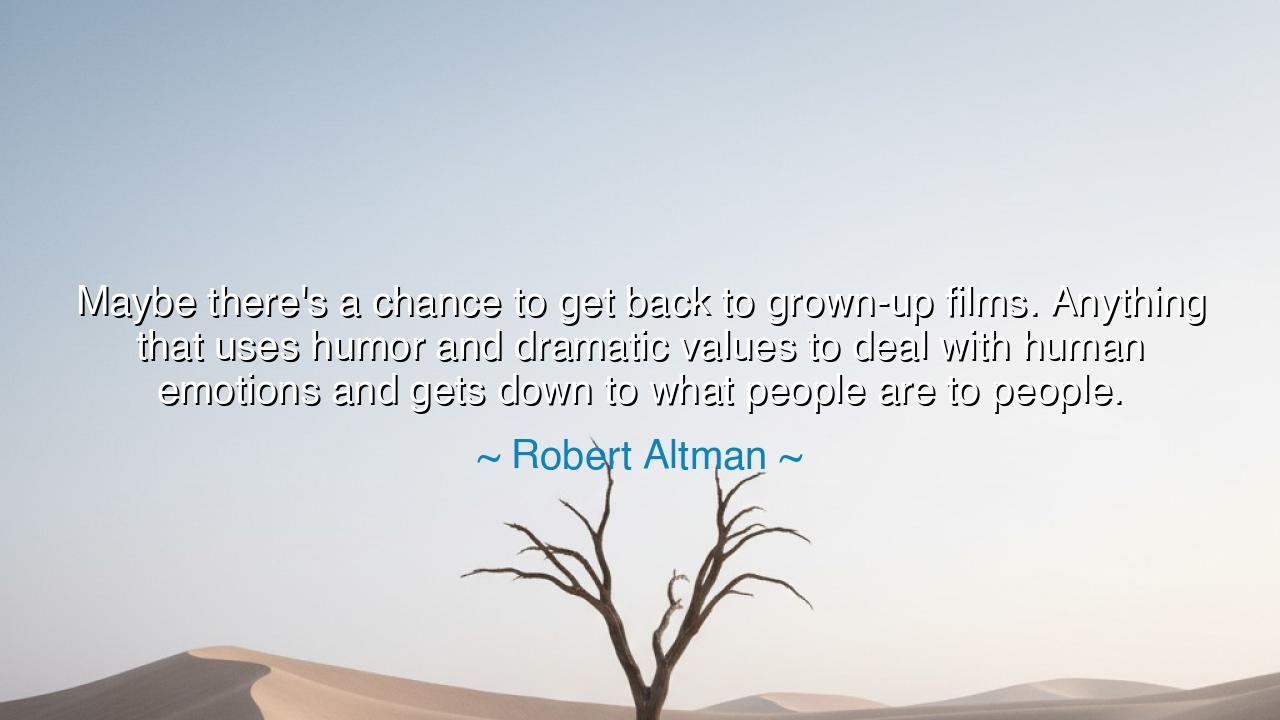
Maybe there's a chance to get back to grown-up films. Anything
Maybe there's a chance to get back to grown-up films. Anything that uses humor and dramatic values to deal with human emotions and gets down to what people are to people.






The words of Robert Altman—“Maybe there’s a chance to get back to grown-up films. Anything that uses humor and dramatic values to deal with human emotions and gets down to what people are to people”—resound like a call to artistic maturity, a yearning for a return to truth in storytelling. In these words lies the voice of a master who saw beyond spectacle, beyond the hollow glimmer of commerce, and sought instead the sacred essence of cinema: the human soul. Altman speaks here not only of film, but of all creation. His wish is the wish of every true artist—to strip away pretense and artifice, and to portray men and women as they are, fragile, complex, and deeply real.
Altman’s lament reveals his discontent with the growing tide of superficial entertainment that had begun to dominate his age—films that dazzled the eye but left the heart untouched. When he speaks of “grown-up films,” he is not speaking merely of stories for adults, but of stories that possess wisdom, that face the contradictions of life without retreating into fantasy. Such films, he believed, honor the full range of human experience—joy and sorrow, humor and despair, laughter mingled with tears. To make such art is to treat the audience not as consumers, but as companions in a shared search for meaning.
In invoking both humor and drama, Altman touches upon an ancient truth: that the two are not enemies, but reflections of the same mirror. For life itself is woven of both—the laugh that hides a tear, the tear that redeems a laugh. From the comedies of Aristophanes to the tragedies of Sophocles, the Greeks understood this balance. They did not divide the sacred from the ridiculous, the serious from the playful. To them, laughter was holy because it revealed humanity in its fullness. Altman’s plea, then, is not only for “grown-up films,” but for grown-up hearts—those capable of embracing the full measure of life, unguarded and unashamed.
To understand his wisdom more clearly, consider the work of Charlie Chaplin, the silent poet of the screen. His film The Great Dictator made the world laugh at tyranny, even as it made them weep for its victims. Chaplin’s humor and dramatic values were not two tools, but one blade—cutting through hypocrisy and fear to expose the tender truth of the human condition. He dealt not in spectacle but in empathy, not in escapism but in understanding. What Altman calls “what people are to people” is precisely this—the unvarnished connection that art can awaken between souls, when it dares to tell the truth.
Altman himself was such a truth-teller. His films—Nashville, MASH*, Short Cuts—wove together laughter and sorrow into living portraits of humanity. He rejected heroes and villains, preferring people—flawed, uncertain, but alive. In his eyes, cinema was not a sermon but a conversation, not a fantasy but a mirror. His words, then, come from the heart of one who loved humanity too much to flatter it, and too deeply to condemn it. His longing to “get back to grown-up films” was the longing of a prophet calling his craft back to purpose.
The origin of such a vision is timeless. In every age, the artist faces a choice: to comfort or to awaken, to entertain or to enlighten. The marketplace favors the first; the spirit demands the second. Altman’s cry echoes through centuries of creators who sought to lift their work from mere imitation to revelation. He stands in the lineage of Rembrandt, who painted the poor with dignity; of Shakespeare, who mingled jesters with kings; of Tolstoy, who found holiness in the ordinary. All of them, like Altman, believed that art’s truest purpose is to show what people are to people—not gods, not ideals, but hearts in communion and conflict.
Let this teaching be carried forward: Create, speak, and live with maturity of heart. Seek truth, not comfort. When you tell stories—whether on screen, in words, or in life—fill them with both laughter and sorrow, for both are sacred. Remember that humor heals what reason cannot, and that drama reveals what laughter hides. To deal with human emotions honestly is to honor life itself. Do not fear the messiness of the human spirit; it is the soil in which beauty grows.
So let us heed Altman’s wisdom: strive to make your life a “grown-up film.” Treat every person you meet as a story worth knowing, a drama worth witnessing, a soul worth understanding. Blend compassion with humor, truth with grace, and remember always that greatness is not found in spectacle, but in sincerity. For in the end, the finest art—and the finest life—is the one that gets down, as he said, to what people are to people.






AAdministratorAdministrator
Welcome, honored guests. Please leave a comment, we will respond soon